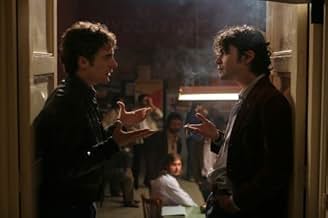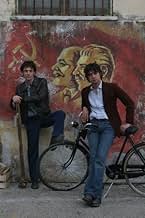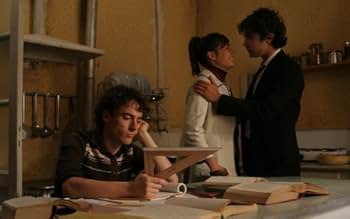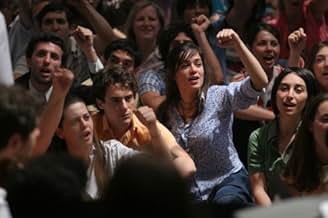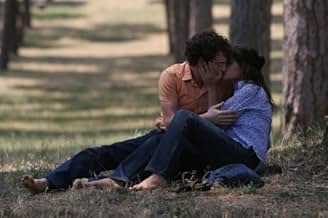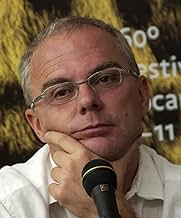IMDb RATING
7.0/10
6.8K
YOUR RATING
Two brothers come of age in a small Italian town in the '60s and '70s.Two brothers come of age in a small Italian town in the '60s and '70s.Two brothers come of age in a small Italian town in the '60s and '70s.
- Awards
- 19 wins & 29 nominations
Antonino Bruschetta
- Segretario Bombacci
- (as Ninni Bruschetta)
Storyline
Did you know
- TriviaTaken from the novel "Il fasciocomunista", the title has been changed in "Mio fratello è figlio unico" as a tribute to the eponymous song by Rino Gaetano.
- SoundtracksSul mio carro (Chariot)
Performed by Sonia Cruceru
Featured review
There's this much to be said for this movie from the ranks of Italy's new young directors and actors: The quality of the acting was at least one notch above the usual fare, which almost never transcends the clichéd facial expressions and intonations we expect to find in TV dramas and sit-coms. This new generation of actors and directors was raised on US television imports ("telefilms") and Latin-American soaps, and it definitely shows in the uninspired and uninspiring quality of their work. And one gets the impression that 90% of them come from Parioli, a very well-to-do neighborhood of Rome, that would be the rough equivalent of coming from Santa Monica, Lake Forest IL, or Westport Conn—all those perfectly groomed faces coming from families of the Italian haute bourgeoisie with unlimited funds to advance their children's "acting career." If it weren't for Elio Germano as Accio (as well as Luca Zingaretti as Accio's fascist mentor and Anna Bonaiuto as his wife), this movie would probably fall into the same category of banalized film-making with all the rest.
But Germano's performance is not enough to salvage a film that fails to rise above a rating of "mediocrity +". Certainly it was an interesting idea to situate the action in Latina, a city built from scratch by Mussolini's fascist regime after it had drained the surrounding swamp land (the "bonifica" that was one of Fascism's highly touted achievements). All of the city's architecture was inspired by fascist "monumental" design.
Regrettably, Luchetti has done little of interest to exploit this setting for his family drama other than to bring up the same old cliché of opposing extremisms (the thuggery of the neo-fascist right vs. the banditry and targeted terrorism of the extra-parliamentary left). And the drama of the conflict between these two extremisms is used altogether too much to drive the plot forward. Some Italian commentators disliked this film because it seemed to go over the same old ground in the same old way—when it was time, presumably, to move on to new subjects. But the problem was not that it rehashed Italian history—the problem was the "hash." Bellocchio, after all, did a wonderful job of re-interpreting to Italians the experience of the Red Brigades in his "Buongiorno,Notte".
But here the audience is simply given a choice between fascist hooliganism and a lunatic left, when actually the situation in Italy in the 60s and 70s was much more complicated and nuanced. Millions of Italians belonged to parties and movements that were seriously committed to a progressive transformation of Italy that did not involve knee-cappings and assassinations. And so Luchetti ends up confirming (perhaps despite himself) the American/Berlusconiano vision of the world: "Forget about ideology—it's all about individual freedom and authenticity in your personal relationships." And finally we can see the effects of Berlusconi's TV stations and their ilk also in the movie's script. After 20, I stopped counting how many times the characters said, "Ma Che Cazzo Dici?"("What the f#%k are you saying?"). It is a measure of the moronization of the Italian public under the sway of Berlusconi and Berlusconian media that the scriptwriters think that they can get a laugh out of an Italian audience with this phrase each and every time it is said—and sadly they're probably right.
But Germano's performance is not enough to salvage a film that fails to rise above a rating of "mediocrity +". Certainly it was an interesting idea to situate the action in Latina, a city built from scratch by Mussolini's fascist regime after it had drained the surrounding swamp land (the "bonifica" that was one of Fascism's highly touted achievements). All of the city's architecture was inspired by fascist "monumental" design.
Regrettably, Luchetti has done little of interest to exploit this setting for his family drama other than to bring up the same old cliché of opposing extremisms (the thuggery of the neo-fascist right vs. the banditry and targeted terrorism of the extra-parliamentary left). And the drama of the conflict between these two extremisms is used altogether too much to drive the plot forward. Some Italian commentators disliked this film because it seemed to go over the same old ground in the same old way—when it was time, presumably, to move on to new subjects. But the problem was not that it rehashed Italian history—the problem was the "hash." Bellocchio, after all, did a wonderful job of re-interpreting to Italians the experience of the Red Brigades in his "Buongiorno,Notte".
But here the audience is simply given a choice between fascist hooliganism and a lunatic left, when actually the situation in Italy in the 60s and 70s was much more complicated and nuanced. Millions of Italians belonged to parties and movements that were seriously committed to a progressive transformation of Italy that did not involve knee-cappings and assassinations. And so Luchetti ends up confirming (perhaps despite himself) the American/Berlusconiano vision of the world: "Forget about ideology—it's all about individual freedom and authenticity in your personal relationships." And finally we can see the effects of Berlusconi's TV stations and their ilk also in the movie's script. After 20, I stopped counting how many times the characters said, "Ma Che Cazzo Dici?"("What the f#%k are you saying?"). It is a measure of the moronization of the Italian public under the sway of Berlusconi and Berlusconian media that the scriptwriters think that they can get a laugh out of an Italian audience with this phrase each and every time it is said—and sadly they're probably right.
- How long is My Brother Is an Only Child?Powered by Alexa
Details
- Release date
- Countries of origin
- Official sites
- Language
- Also known as
- My Brother Is an Only Child
- Filming locations
- Production companies
- See more company credits at IMDbPro
Box office
- Budget
- €5,000,000 (estimated)
- Gross US & Canada
- $255,620
- Opening weekend US & Canada
- $9,357
- Mar 30, 2008
- Gross worldwide
- $12,894,062
- Runtime1 hour 48 minutes
- Color
- Sound mix
- Aspect ratio
- 1.85 : 1
Contribute to this page
Suggest an edit or add missing content

Top Gap
By what name was Mio fratello è figlio unico (2007) officially released in India in English?
Answer





